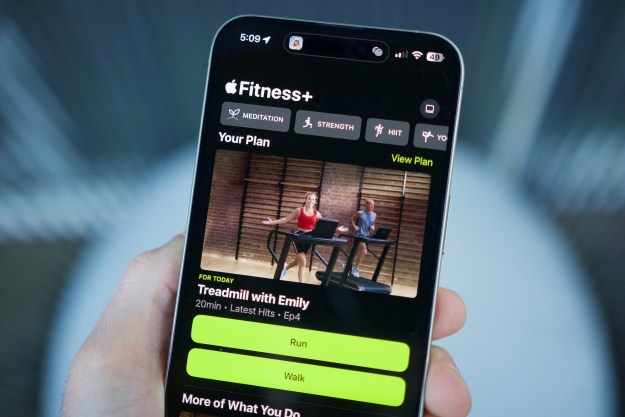
It’s no wonder, really, that they’ve gained notoriety among the tech savvy, but there’s a startup company that’s hoping to challenge those preconceptions. It’s called Electric Objects, and its growing team of more than 15 employees is attempting to build more than just a monitor and a pretty frame. Indeed, the Manhattan, New York-based startup has its mind set on nothing less than democratizing the sort of artwork relegated to faraway museums and fancy galleries. And this Tuesday, it took yet another step toward that vision.
The startup’s newest innovations take the form of the EO2, a connected digital art frame, and a service it calls the Art Club, a monthly subscription that delivers access to “thousands” of commissioned art pieces.
The result is the truest realization yet of what’s been the company’s mission since its founding in 2014, co-founder Jake Levine told Digital Trends. “We started the company three years ago after realizing that art, unlike music, movies, or literature, doesn’t have a seamless way to discover new works in a regular basis,” he said. “Art’s unlike music, movies, or literature — you don’t have very many encounters with it on a regular basis. There’s no way to discover new stuff.”
The EO2 isn’t the company’s first hardware rodeo. It’s the follow-up to the EO1, a digital art frame Electric Objects launched on Kickstarter in 2014, and appropriately packs a bevy of upgrades. It’s thin (0.75 inches), sports an improved 1080p LCD display and a Wi-Fi antenna with support for both 2.4GHz and 5GHz networks, and packs a dual-core processor paired with 2GB of RAM. It does without a matte screen in order to minimize screen glare, and utilizes an ambient light sensor to automatically brighten and dim the display according to surrounding lighting conditions. And it draws impressively little power: the EO2 requires no more wattage than “the average lightbulb.”
“It delivers an experience that’s highly optimized,” Levine said. “The display is critical.”

Perhaps the bigger news is Art Club, a $10 monthly subscription service that might aptly be described as the “Netflix of art.” It’s a rotating collection of new and curated artwork funded by both the “hundreds of thousands” donated by members of Kickstarter and the more than $7.49 million raised from venture capital backers including the Palo Alto, California-based Bessemer Venture Partners.
It’s far more than a token endeavor. At launch, Art Club will provide access to “almost a thousand” pieces of original art, Levine said, many supplied by the nearly 200 artists — among them Björk, Ai Weiwei, Zach Gage, YACHT, and Sam Cannon — paid from a $100,000 fund Electric Objects established last year. The startup has already commissioned and released over 100 collections, and late last year selected 30 artists to be featured and promoted as part of Art Club Open Call, its annual general submission period.
Art Club isn’t the only source of artwork from which the EO2 will draw. It will benefit from Electric Objects’ preexisting partnerships with the New York Public Library, Museum of the Moving Image, and animated GIF libraries Giphy and Digg, and it will tap Electric Objects’ community contributions — more than 30,000 pieces of animation, photography, and video that Electric Objects owners have uploaded for public consumption.
The wealth of material speaks to the hardware’s “accessibility,” Levine said. “Art shouldn’t be this thing that a small number of people appreciate — it should be something we all enjoy.”
A paucity of community art platforms — of easy ways to share paintings, photography, and animation in the same way you might, say, stream a movie on Netflix — was what motivated the company’s first hardware effort, the EO1, in 2014. Levine, a former Betaworks employee who helped lead the relaunch of social network Digg, was inspired by the writings of futurists at the legendary Xerox Parc. They predicted an era of “calm technology,” comprised of ubiquitous machines, personal computers, and handhelds that blend into the background, operating at the “periphery of our awareness.”
“When we go and get exposed to artists at a museum, it’s an engaging, inspiring experience,” he said. “You can’t take it home with you. We don’t have many encounters with it on a regular basis.” Levine contends that technologies like the EO2 can deliver a measure of that experience to your living room, foyer, kitchen, or elsewhere. “We’ve build a platform that has the same sort of discovery that a gallery offers you,” he said. “We can provide the physical presence that a museum offers in your home.”

And to those inclined to dismiss Electric Objects’ hardware as a fancy computer monitor, Levine argues that the platform, not just the hardware, is what makes a difference. “TVs are great at being watched, Kindles are great at being read, and the EO2 is great for displaying art in your home,” he said. “It’s permanent, and that offers you an intimacy and an opportunity for reflection that you’re not going to get out of a multipurpose screen. This is the experience that people interact with art in their lives.”
The EO2 starts at $300, and will ship alongside four configurations of hardwood frame sold separately: black and white painted frames ($80), and walnut and maple handmade wooden frames ($100). Art Club starts at $10.

